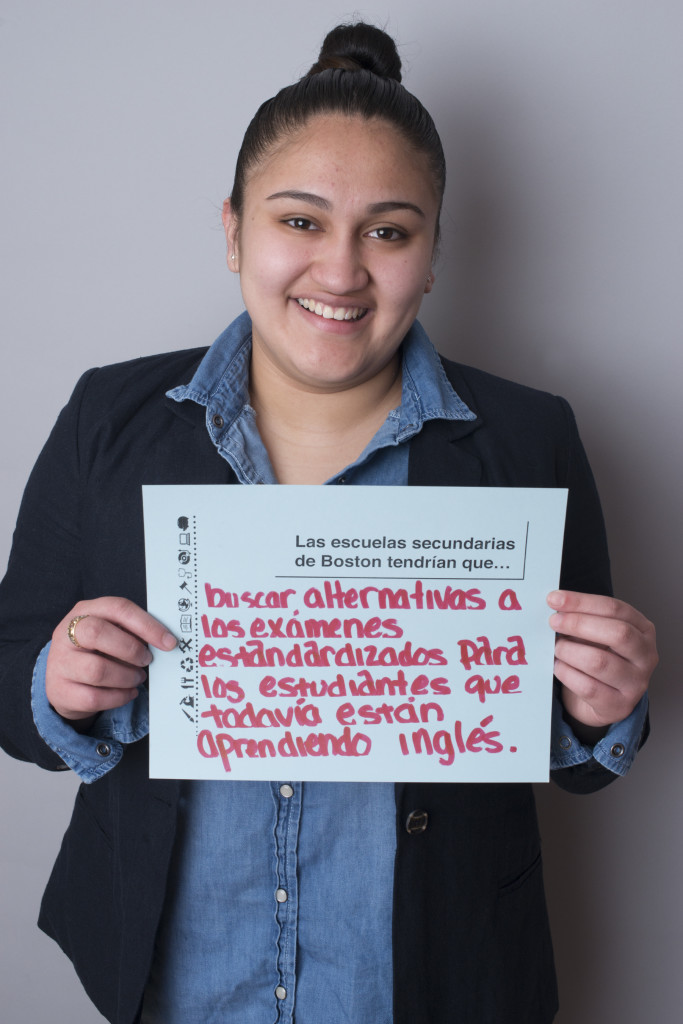
By Kenya Reyes
Uno de los mayores problemas de las Escuelas Públicas de Boston es el bajo rendimiento académico de los estudiantes latinos, demostrado en el bajo porcentaje que obtienen en las pruebas estandarizadas que les ofrece el Estado. Su rendimiento es inferior al compararlo con de los demás estudiantes de la ciudad. Esta diferencia en el rendimiento académico entre los latinos y los otros grupos es importante y consistente a través del proceso educativo- desde Kindergarten hasta 12mo grado. La mayoría de los estudiantes que están en el proceso de aprender inglés tienen diferentes niveles de rendimiento académico ya que, al no poder mostrar sus habilidades en su idioma, son evaluados injustamente. Todos los estudiantes deben ser evaluados en su nivel académico y en su idioma natal para que sea justo. También, las escuelas deben brindar apoyo a los estudiantes en su primer idioma para que sus destrezas académicas mejoren en su idioma natal y así puedan transferirlas a su idioma secundario. Algunos maestros piensan que una rúbrica es la mejor herramienta para evaluar a los estudiantes que están en el proceso de aprender inglés.
Durante el año, tanto los maestros como el distrito evalúan a los estudiantes sobre lo que han aprendido para observar su progreso. La mayoría de los estudiantes que están aprendiendo inglés, después de un año, deben tomar un examen para medir su nivel de inglés. En el pasado, las personas tenían la oportunidad de decidir si querían tomar las evaluaciones o no. Hoy en día hay muchas desventajas porque los estudiantes no tienen la oportunidad de decidir esto y los exámenes estandarizados, más que medir su aprovechamiento académico, terminan midiendo el nivel de inglés que han adquirido hasta ese momento.
Here is an excerpt of my interview with Wanda Muriel, the English as a Second Language teacher at the Margarita Muñiz Academy about the effectiveness of assessments for English Language Learners.
Kenya: So, what’s the purpose of standardized assessments [for English Language Learners]?
Wanda: So, the assessment that I give is called the ACCESS and it’s evaluating English Learners progress in Reading, Writing, Listening and Speaking and it is a national test that public school students have to take to monitor their English language development.
Kenya: In what way do you think assessment should be scored?
Well, I think assessments should be more of a holistic thing and about how the students have progressed during their entire year, not just on one particular test. The test that we are taking right now, the ACCESS test, is only one assessment. So, to me, it doesn’t hold as much weight as what I have done with the students all year- round. And, how should they be scored? So, we use rubrics based on the learning targets and the language goals and, from there, we should monitor them.
Wanda: What topic do you think is hard to be scored for ELL students?
I think it is hard to evaluate the listening piece, and maybe the speaking, because the speaking is really sometimes my own opinion. Another teacher can think that the kid scores differently on the ACCESS. I think probably the speaking part is the hardest to evaluate to make sure that you are trying to match what the kid is saying to the rubric that the ACCESS test uses, that you are meeting those goals.
Kenya: Do you think students should be tested using alternative assessments?
Wanda: I don’t think the standardized test should be the only evaluation tool for teachers. Sometimes kids develop strategies , they might be good test-takers. But some other kids whom are maybe really good students are not good test takers. So, you have to have different ways of assessing students, whether in the classroom, their participation, speaking in the classroom, the daily discussions that you do, the reading, how they are interpreting the readings, the writing, how are they responding to different types of writing. So, I don’t think that the assessments necessarily capture everything that a student can do.
You must be logged in to post a comment.